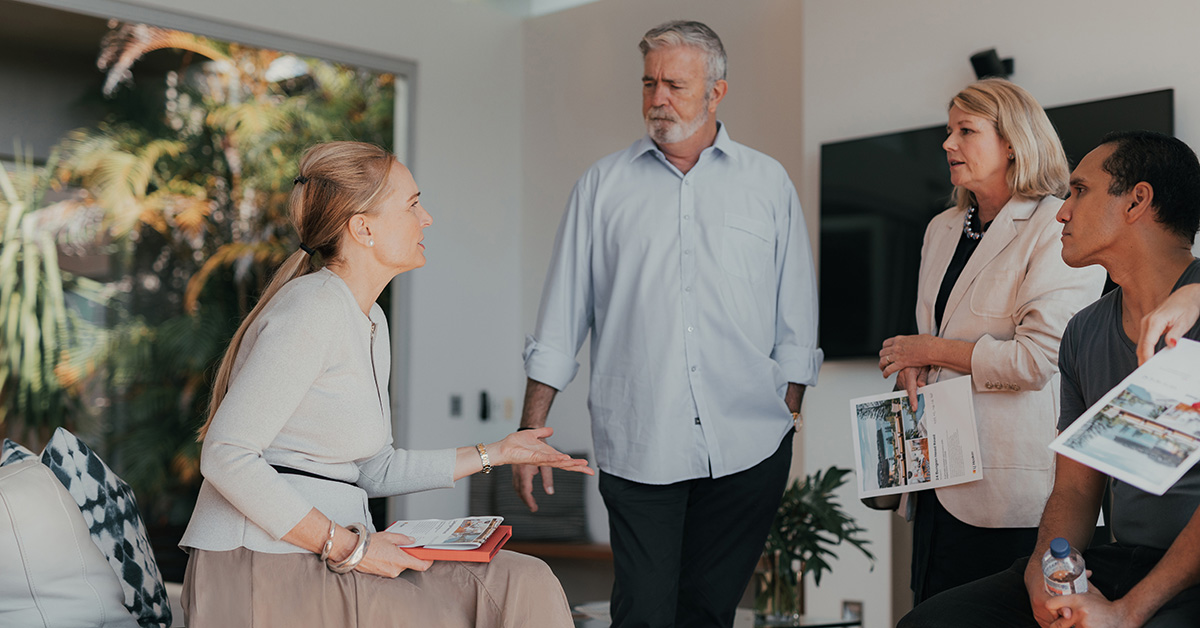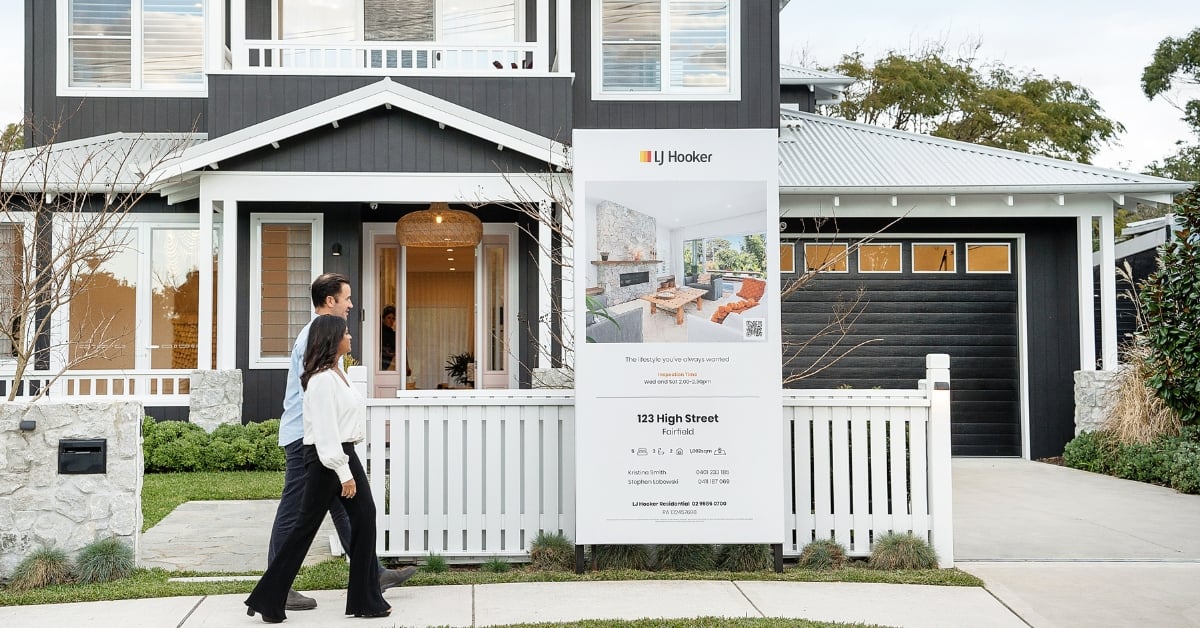Buying Real Estate FAQs

Enlisting the help of a trusted real estate agency can help you navigate the often-tricky world of residential real estate. With offices across most of Australia's major cities, towns and suburbs, your local LJ Hooker real estate agent is perfectly-placed to provide you with advice and assistance relevant to your local real estate market.
What questions should I ask the agent when buying a home?
- Can you show me a recent property sales report to show what the house is worth?
- Why is the vendor selling?
- How long has the property been on the market?
- Are there any known issues with the property, land or neighbours’ properties?
- Exactly what is included in the sale?
- How long have the owners lived there?
- Is the property listed? If so, what grade is it? And is it in a conservation area?
- How much are council rates / strata fees?
Why should I buy with LJ Hooker?
Enlisting the help of a trusted real estate agency can help you navigate the often-tricky world of residential real estate. With offices across most of Australia's major cities, towns and suburbs, your local LJ Hooker real estate agent is perfectly-placed to provide you with advice and assistance relevant to your local real estate market.
Your local LJ Hooker real estate agent can also help you through every stage of the property buying process, including finding a property within your price range, organising finance, reports and searches, conveyancing and in some cases, even helping to connect your utilities.
What are the steps to buy a home?
- Own a home? Get an appraisal as this is a great way to find out how much equity you already have. Your local LJ Hooker agent can give you a free property appraisal to help you here.
- Contact a LJ Hooker Home Loans specialist to discuss your home buying plans and borrowing capacity
- Create a budget and save deposit
- Choose a home loan and apply for pre-approval
- Research property market and neighbourhoods
- Finalise property must-haves
- Start house hunt
- Lawyer / conveyancer to review contract
- Get a building inspection
- Make offer or bid at auction
- Sign contract and pay deposit
- Arrange insurance
- Process First Home Owner Grant
- Complete settlement and move in
What are the different ways to buy a home?
There are 4 main ways to buy real estate in Australia:
- Private treaty - when the vendor, or home owner sets the price they would like to sell their property for and their real estate agent negotiates individually with prospective buyers to achieve a sale as close to this price as possible.
- Auction - which is a public sale conducted by a licensed auctioneer. Properties are offered up for bid and if the reserve price is reached the property is sold to the highest bidder
- Tender and Expression of Interest are processes wherein you submit a single offer, usually accompanied by a 5 or 10 per cent deposit, and it is accepted or rejected by the vendor.
What are the costs of buying a property?
- Deposit - usually 5-20% of the home’s overall cost
- Stamp Duty - differs in each state
- Lenders mortgage insurance if you borrow more than 80% of the property purchase price
- Building insurance
- Legal help such as lawyers or conveyancers
- Building, pest and strata inspections
- Council rates and strata fees
- Moving costs
How can I work out the budget I can afford to buy a home?
Talk to the experts at LJ Hooker Home Loans, they can help assess your current earning and assets and develop a plan with you.
What is the first home buyer grant?
The First Home Owner Grant (scheme) was established to assist eligible first home owners to purchase a new home or build their home by offering a grant. The grant amount is determined by the date of the eligible transaction and each state has different rules and regulations.
What is stamp duty?
Stamp duty is a charge which is applied by state governments in Australia and is in relation to the transfer of land or property. The State Government charges may vary depending on the purpose of the property purchased.
Where do I search for properties?
Website portals such as ljhooker.com.au, realestate.com.au and domain.com.au are excellent resources along with regional and local newspapers. Also contact your local LJ Hooker real estate agent as they are experts in the local area and may know other properties that are up for sale
What research should I do before buying a home?
Doing due diligence on the property market gives you important understanding of where you can buy, and how much it will cost.
- Australian Property Monitors and CoreLogic RP Data are excellent online providers of property data and information.
- Websites like domain.com.au, realestate.com.au and agent sites like ljhooker.com.au will show you what is on the market.
- Talk to your local LJ Hooker agent as they have a depth of knowledge on the local market.
What happens on auction day?
On auction day if you are wanting to bid, you must register in the bidders record and you will receive a bidders number that you will use when bidding.
The auctioneer will outline all rules before the bidding begins, including their obligation to refuse bids after the hammer falls, to arbitrate bid disputes and also to refuse bids that come from those who have not registered for the auction. There may be more specifics depending on where the auction takes place, so check the rulings and listen carefully to the auctioneer. If you are the successful bidder and the property sells to you, you are required to sign the contract immediately and pay a 10% deposit. There is no cooling off period if you buy at auction.
What auction terms should I know?
It is important that you understand these terms before your bid at an auction: Bidders guide, Inspection, Vendor and Dummy Bids, Rises and Advances, Reserve, On the Market and Passed In.
What should I look for in a neighbourhood?
To determine the right neighbourhood for you, consider your pace of life - are you young and is the proximity to friends and entertainment important or are you looking for a quieter suburb. If you have family plans consider schools, transport and amenitites and safety of suburb. Consider where you work and the daily commute.
What is the settlement?
Closing (also referred to as completion or settlement) is the final step in executing a real estate transaction. The closing date is set during the negotiation phase, and is usually several weeks after the offer is formally accepted. On the closing date, the ownership of the property is transferred to the buyer.
Do I need a pest inspection?
You don’t need a pest inspection but it is recommended that you get one to ensure the property you are buying has no major issues as this could save you a lot of money in the future.
Who is eligible to receive the first home owner grant?
To qualify for the first home owner grant you must meet the following criteria: each applicant is a person and not a company or trust, the applicant is a permanent resident or Australian citizen. Each applicant must be 18 years of age or above. All applicants and / or their spouse / de facto, have not owned a residential property, jointly or separately in any state or territory of Australia before July 2000. Each applicant must have entered into a contract for the purchase of a home and the total value of the home does not exceed the cap amount for eligible transactions (different in each state). Must also be the first time an applicant/spouse or de facto will receive the grant and that at least one applicant will occupy the home as their principal place of residence for a continuous period of 6 months commencing within 12 months of purchase.
DISCLAIMER - The information provided is for guidance and informational purposes only and does not replace independent business, legal and financial advice which we strongly recommend. Whilst the information is considered true and correct at the date of publication, changes in circumstances after the time of publication may impact the accuracy of the information provided. LJ Hooker will not accept responsibility or liability for any reliance on the blog information, including but not limited to, the accuracy, currency or completeness of any information or links.



